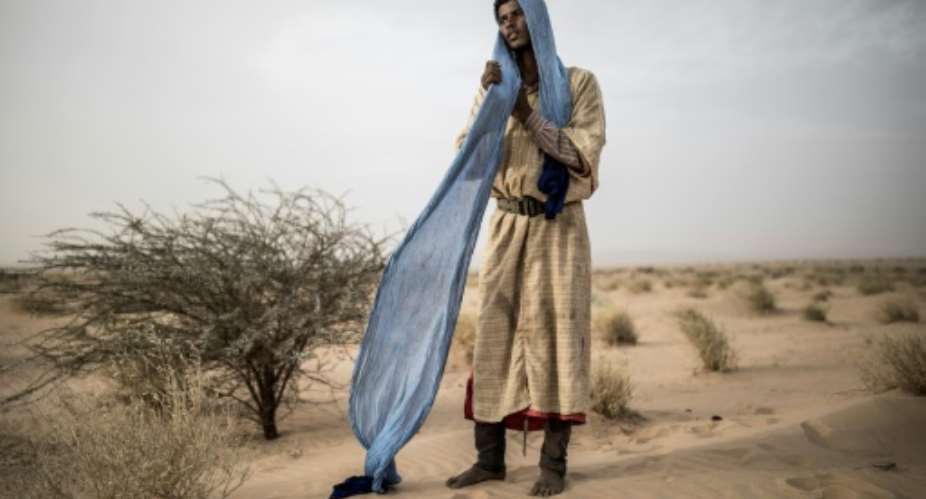In the arid West African country of Mauritania, the way of life of the traditional group of hunters known as the Nemadi is slowly disappearing.
Experts say the small ethnic group of black Mauritanians, also known as N'Madi, now numbers in the hundreds at most, their livelihoods hit by repeated droughts and declining game.
 Some Nemadis have abandoned their traditional way of life to become camel herders. By JOHN WESSELS (AFP)
Some Nemadis have abandoned their traditional way of life to become camel herders. By JOHN WESSELS (AFP)
Those that are left mostly scour the desert for ostriches, oryxes and white antelope to hunt.
In January, AFP travelled for five days between the desert hamlets of Tichitt and Aratane in central Mauritania, guided by three Nemadi: Ahmadou, his son Ahmed and a third man named Cheih.
 More and more Nemadi have given up their old ways since the great drought in the Sahel region in the 1970s. By JOHN WESSELS (AFP)
More and more Nemadi have given up their old ways since the great drought in the Sahel region in the 1970s. By JOHN WESSELS (AFP)
All three, dressed in tunic-like robes, have abandoned their traditional way of life to become camel herders.
More and more Nemadi have given up their old ways since the great drought in the Sahel region in the 1970s. True hunter-gathers are now few and far between.
 Ahmadou own camels, a traditional symbol of wealth in Mauritanian society. By JOHN WESSELS (AFP)
Ahmadou own camels, a traditional symbol of wealth in Mauritanian society. By JOHN WESSELS (AFP)
In Loudeyatt, one of the nomadic Nemadi's campsites, a dozen tents are home to about 50 people, and a few bleating goats. There is also a French-language school, although it has few supplies.
The Nemadi have few physical possessions and traditionally, no livestock.
 A Nemadi woman in Loudeyatt, where a dozen tents are home to about 50 people and a few bleating goats. By JOHN WESSELS (AFP)
A Nemadi woman in Loudeyatt, where a dozen tents are home to about 50 people and a few bleating goats. By JOHN WESSELS (AFP)
They are marginalised in wider Mauritanian society for their poverty, according to experts.
But some, such as Ahmadou, now own camels, a traditional symbol of wealth in Mauritanian society.





 Dumsor: Energy sector ‘shepherdless’ – Nana Amoasi VII
Dumsor: Energy sector ‘shepherdless’ – Nana Amoasi VII
 Train accident: Four more grabbed and remanded
Train accident: Four more grabbed and remanded
 Gov't to consolidate cash waterfall revenue collection accounts
Gov't to consolidate cash waterfall revenue collection accounts
 Gov't to settle lump sum for retired teachers by April 27
Gov't to settle lump sum for retired teachers by April 27
 Former PPA CEO granted GH₵4million bail
Former PPA CEO granted GH₵4million bail
 Dumsor: The darkness has exposed you; you’ll go down as the worst in Ghana’s his...
Dumsor: The darkness has exposed you; you’ll go down as the worst in Ghana’s his...
 Dumsor: The ‘incompetent’ person provided a timetable whiles those who came to s...
Dumsor: The ‘incompetent’ person provided a timetable whiles those who came to s...
 Defend, ensure NPP’s good works are ‘sold’ and highlight the ‘bad’ state of the ...
Defend, ensure NPP’s good works are ‘sold’ and highlight the ‘bad’ state of the ...
 Bawumia will rank high ahead of Mahama in any anti-corruption test — Salam Musta...
Bawumia will rank high ahead of Mahama in any anti-corruption test — Salam Musta...
 NPP trying to bribe us but we‘ll not trade our integrity on the altar of corrupt...
NPP trying to bribe us but we‘ll not trade our integrity on the altar of corrupt...
